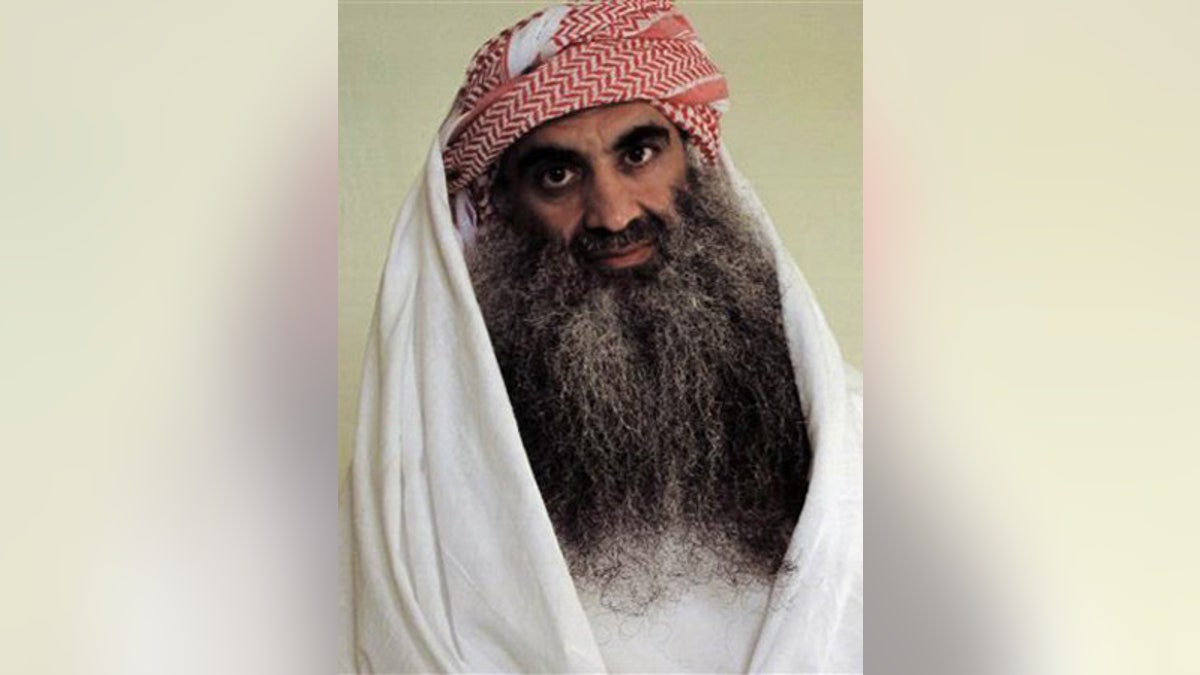
A man identified by an Arabic language Web site as Khalid Sheik Mohammed is seen in detention at Guantanamo Bay, Cuba. (AP)
Attorney General Eric Holder's announcement to bring Khalid Sheikh Mohammed and four others detained at Guantanamo Bay, Cuba, to trial at a New York City courthouse was received by families of Sept. 11 victims with mixed reaction Friday.
Many of the relatives expressed opposition to any civilian trial for terror suspects — especially at the federal courthouse 1,000 yards from the spot where nearly 3,000 people died.
Some called the decision a terrible mistake, while others said the trial would give the men a platform to "spew" their anti-American hatred and invective.
Ed Kowalski, of the 9/11 Families for a Secure America Foundation, said: "To allow a terrorist and a war criminal the opportunity of having U.S. constitutional protections is a wrong thing to do and it’s never been done before. President Obama is wrong to do this."
"If we have to bring them to the United States, New York City is not the place to have it, let alone in a courthouse that is in the shadows of the twin towers," Lee Ielpi, whose firefighter son died in the 9/11 attacks, said. The city's wounds, he said, are simply still too raw.
"Ripping that scab open will create a tremendous hardship," he said.
"We have a president who doesn't know we're at war," said Debra Burlingame, whose brother, Charles Burlingame, had been the pilot of the hijacked plane that crashed into the Pentagon. She said she was sickened by "the prospect of these barbarians being turned into victims by their attorneys."
But Lorie Van Auken, whose husband Kenneth was killed in the World Trade Center attacks, voiced support for the decision, saying the trials would help to bring closure.
"I'm glad to hear they are going to be brought to New York to the scene of the crime and giving the families that were affected the chance to actually watch the trial," Van Auken told Reuters.
Valerie Lucznikowska, whose nephew died at the World Trade Center, said she would not care if the suspects sounded off in court, so long as the victims' families got to see them put on trial.
"What are words? It was a horrible thing to have 3,000 people killed," she said.
Trying the men in civilian court is a risky move and is likely to confront a host of difficult issues, including rough treatment of detainees, sensitive intelligence gathering and the potential spectacle of defiant terrorists disrupting proceedings.
U.S. civilian courts prohibit evidence obtained through coercion, and a number of detainees were questioned using harsh methods some call torture.
Holder insisted both the court system and the untainted evidence against the five men are strong enough to deliver a guilty verdict and the penalty he expects to seek: a death sentence for the deaths of nearly 3,000 people who were killed when four hijacked jetliners slammed into the towers, the Pentagon, and a field in western Pennsylvania.
The Times of London and the Associated Press contributed to this report.
